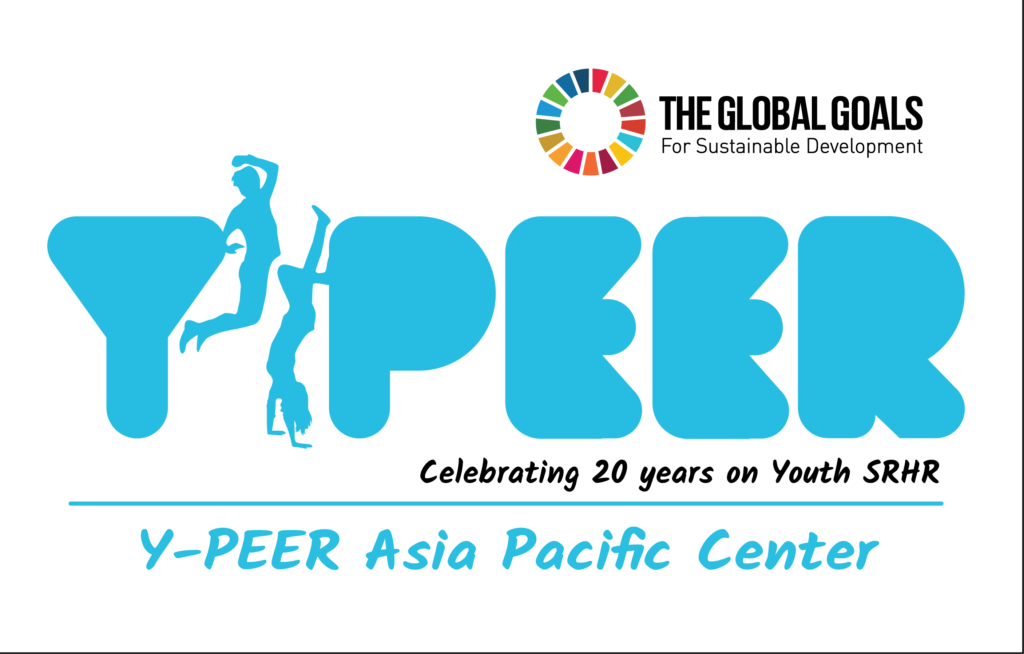Y-PEER BACKGROUND
Y-PEER is a groundbreaking and comprehensive voluntary youth-to-youth initiative. It is a network of youth-led and youth-serving civil society organizations, governmental organizations, community-based organizations, institutions, youth activists, young people, youth advocates and trainers working together on youth-related issues. The issues championed by Y-PEER are physical and mental health, sexual and reproductive health and rights (SRHR) including HIV/AIDS; gender-based violence (GBV), youth participation, civic engagement and development of a culture of citizenship; preparedness and emergency response and peacebuilding. Y-PEER is a global network of more than 2000 non-profit organizations and governmental institutions; with active memberships of over 33,000 young people and hundreds of thousands of volunteers from the Asia Pacific, Eastern Europe, Central Asia, Africa, and the Middle East.
HISTORY
The Youth Peer Education Network is a comprehensive youth-to-youth initiative. Connecting thousands of young people, Y-PEER aims to promote healthy lifestyles and to empower young people at different levels through peer to peer approach. Y-PEER was created by UNFPA (United Nations Population Fund) in partnership with UNICEF (United Nations Children’s Fund).
Y-PEER was launched in 1999 and established in 2011 by UNFPA as a network of organizations and institutions, working in the field of Sexual and Reproductive health and has branches in more than 50 countries throughout the world. Y-PEER was established to support, provide information and train young people on the number of issues, in particular sexual and reproductive health and rights issues.

Y-PEER CENTERS AND NATIONAL OFFICES
- Bulgaria Office 2007 ( Foundation hosted by the Ministry of Health, Bulgaria)
- Jordan Office 2014 (Center hosted by King Hussain Foundation, Jordan)
- Bangkok Office 2016 (Center Hosted by Youth Organisation – Youth-LEAD)
There are National offices and centers and sub-national office across different countries with currently more than 50 National Networks in 3 regions
- Networks have many forms of organization, such as NGOs, National Networks, Local Networks, Groups, focal points
- Established under the same/similar modality
- Asia Pacific Region exists in more than 12 countries

Y-PEER ASIA PACIFIC CENTER
The Y-PEER Asia Pacific Center is a new regional office established in Bangkok, Thailand. The center is supported by RCNF (Robert Carr Funds for Civil Society Network), UNFPA Asia Pacific Regional Office (UNFPA APRO) and hosted by Youth Lead (the regional Asia Pacific Network of Young Key Affected Population) who is a partner organization of Y- PEER.
Y-PEER Asia Pacific Center will also be working together with Y-PEER International, UNFPA APRO, UNFPA Headquarters, and Country Offices and other partners, in order to support the peer educators of Y-PEER and other networks in the region. This year, the center will be supporting Y-PEER national networks with some small-scale funds, so that they work more closely on issues related to sexual and reproductive health and rights, and will help the establishment of new national networks. The center has the plan to reactivate the existing national network in Laos, as well as to support the establishment of new national networks in Vietnam, Maldives, Cook Islands, Tonga, Solomon Island.
ESTABLISHMENT OF NATIONAL NETWORKS IN ASIA PACIFIC REGION
Registration Networks
Y-PEER Philippines NGO – 2013
Y-PEER Nepal NGO – 2015
Y-PEER Kiribati NGO – 2017
Y-PEER Mongolia NGO – 2018
Y-PEER Afghanistan NGO – 2019
Other networks receiving small grants from the Asia Pacific Center
Y-PEER Vietnam – 2016
Y-PEER Bhutan
Y-PEER Laos
Y-PEER Kiribati